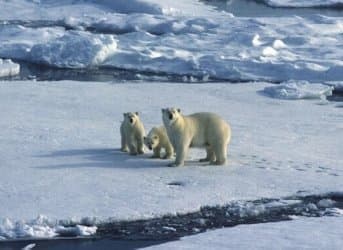About 635 million years ago, the Earth was covered by ice from pole to pole in what is being described as “Snowball Earth”, which is now becoming a trendy new topic in the polarized climate change debate.
During “Snowball Earth”, the global mean temperature would have been about -50 degrees Celsius (-74 degrees Fahrenheit) as the sun’s radiation was reflected back into space by the icy surface. In simpler terms, let’s call it life on Mars.
The scientific research suggests this ice age was brought on by a lowering of atmospheric greenhouse gases to near-present levels through tectonically-mediated rock weathering, when the Sun was considerably dimmer than present.
Researchers from Louisiana State University have tried to put “Snowball Earth” into a perspective that threatens to upset the climate change debate to some extent.
Huiming Bao, Charles L. Jones Professor in Geology & Geophysics at LSU notes: “The story is to put a time limit on how fast our Earth system can recover from a total frozen state. It is about a unique and rapidly changing post-glacial world, but is also about the incredible resilience of life and life’s remarkable ability to restore a new balance between atmosphere, hydrosphere and biosphere after a global glaciation.”
According to an LSU press release: “Normally, carbon dioxide levels in the atmosphere are in balance with levels of carbon dioxide in the ocean. However, if water and air were cut off by a thick layer of ice during Snowball Earth, atmospheric carbon dioxide levels could have increased drastically. In a phenomenon similar to the climate change Earth is witnessing in modern times, high levels of atmospheric carbon dioxide would have created a greenhouse gas warming effect, trapping heat inside the planet's atmosphere and melting the Marinoan ice. Essentially, the Marinoan glaciation created the potential for extreme changes in atmospheric chemistry that in turn lead to the end of Snowball Earth and the beginning of a new explosion of animal life on Earth.”
Related article: China's Smog Becoming an International Issue
It’s not a new theory, but it’s one that’s now being pulled out of the closet due to the polarization of the climate change debate. One figure who has lent some controversial attention to the Snowball Earth story and what it means for climate change is Anthony Watts.
Watts is an increasingly controversial figure who has walked a path that began with great concern about climate change and ended with what he describes as a “lukewarm” pragmatic skepticism.
In a recent interview with Oilprice.com, Watts—a former TV meteorologist—said that while climate change is real, it’s not catastrophic, and it may very well be that a greater concern is that things will get too cold.
He has particularly honed in on the Snowball Earth research, which to his mind demonstrates the Earth’s ability to heal itself.
Related article: Analysing the Link between Air Pollution and Heart Attacks
“The Earth is resilient and self-regulating--just look to the past to see how it has self-stabilized,” Watts told Oilprice.com. “It has a built-in thermostatic mechanism and the temperature has been remarkably constant during the recent Holocene, though it was warmer in the past. Via technology, we can always apply ways to keep cool, but we really can’t get out of the way of advancing mile-thick ice sheets when the next ice age starts making an appearance. I think we worry about the wrong problem; cold is the biggest threat to humanity, not warmth.”
(See the full interview with Antony Watts here)
So, could it happen again? No one really knows, but the global climate has cooled quite a bit over the last 50 million years; and 20,000 years ago saw the Last Glacial Maximum, during which the ice extent mirrored that of “Snowball Earth”. At the same time, scientists say, the Sun is about 6% more luminous today than it was during “Snowball Earth”. Because solar luminosity will only rise in the future, according to scientists, the prospects of another “snowball Earth” are less likely.
The theory doesn’t really do either camp any particular favors: What it does do is remind us of how little we really know and how easy it is to get caught up in the politics when we can’t understand the science.
By. Charles Kennedy of Oilprice.com



















In terms of the actual science of climate change there is very little debate. Each year that passes further confirms our fears. That public awareness is filtered through sources with a particular agenda such as Oilprice is the source of confusion and has lead to the polarization of discussion.
Just finished reading James Lovelock on how the climate balances itself. The problem for the inhabitants of the globe is that when the climate is stressed it can dramatically shift its point of balance. Warmer temperatures blithely touched on in the article were at times accompanied by a sea level 120m higher than the present.
While this magnatude of change is not expected almost all predictions emerging from the field of climate science are for 40cm+ sea level rises and increasingly extreme weather.
Anyone with eyes to observe and an open active mind can already see emerging impact that co-incide with the predictions of climate scientists dating back some 50+ years.
explained this in layman's terms , even i could relate to it.
"It has a built-in thermostatic mechanism."
250 million years ago, the oceans heated up to an average temperature 15 degrees warmer than they are at present. Virtually all life in the oceans died. 3/4 of all land species died.
There was no thermostat then, and there isn't one now.
Anthony Watts is utterly clueless. He has a long history of emitting opinions that are then proven wrong.